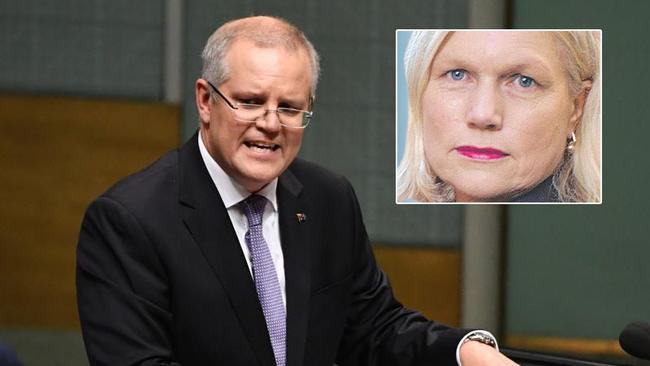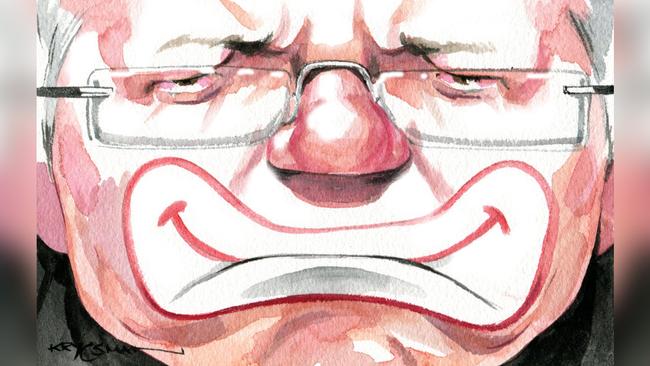
I have a confession to make. Even though I have worked as a professional economist for more than 40 years, there have been many when I have taken little notice of the budget.
I may have tuned in to the treasurer’s budget speech, but I often have wandered off to do something important, like the washing up. The budget is essentially a marketing opportunity for the government to strut its stuff and announce some over-the-top plans the aims of which will never be met. It’s not a serious economic event.
And it has become worse over the years, dating back to the time when budgets were given titles. You know the sort of syrupy, misleading blather: A Position of Strength, Delivering on Our Plan for Jobs and Growth, Strong Economy and Fair Australia, More Help for Families; the list goes on. You can just imagine the hours of meetings needed to come up with just those.
It’s also why the days after the budget are handed over to the treasurer, so he can shine without the prime minister or other government frontbencher attempting to steal his limelight. Expect an onslaught of boring interviews from Scott Morrison repeating various slogans and factoids sourced from the budget and delivered on high rotation.
This charm offensive by a treasurer hasn’t worked politically for many years — there is no evidence of a government receiving a lift in the polls after a budget irrespective of the extent of the handouts included — but it won’t stop Morrison trying. Think of a sentence with “head”, “banging” and “wall”, and you get the message.
So what am I expecting from tonight’s budget apart from the preceding hours of tedious incarceration associated with being locked up in the bowels of Parliament House? Note that these lockups are an almost entirely Australian affair. The US doesn’t really have a budget. And in Britain the chancellor of the exchequer simply walks into the House of Commons and delivers the budget speech.
Our lockup, which imposes extraordinary costs on media outlets, is part of the marketing exercise. But it becomes harder to justify each year as the pre-budget leaks become torrential. There is rarely any wow factor left by the big day.
The treasurer, with attendant advisers, waltzes through the various rooms of the lockup to pretend to answer the questions of kowtowing journalists. Ditto the finance minister and the assistant treasurer, now pompously called the minister for revenue and financial services, which enables her to sneak into cabinet.
Actually, Kelly O’Dwyer may well give the travelling circus thing a miss this year, given her recent “birthday cake” interview about the banking royal commission.

Here are some of the things I’ll be looking for in the showbag of budget papers that Treasury officials hand out in exchange for my mobile phone. Of course, the large number of trees sacrificed to snow the journalist-prisoners is part of the stage show.
These days, the commonwealth budget is looking increasingly like state government budgets, with the recurrent situation looking OK but masking the racking up of spending and debt in the capital account. At least the states are explicit about this fiscal arrangement.
In the case of the federal government — and shame on Finance Minister Mathias Cormann for allowing this to occur — large chunks of capital spending are recorded off-budget because they are “commercial” and it’s consistent with some arcane government accounting rules.
But no one believes the National Broadband Network is ever going to make a commercial return on the taxpayers’ money expended, particularly with 5G coming down the pike. Still, all that expenditure sits off-budget. And no one believes the wacky inland railway line will ever make money but the capital expenditure will be recorded off-budget.
It is always important, therefore, to track the time path of federal government debt to get a true picture of the fiscal position. Total commonwealth government securities on issue have increased by more than $450 billion in a decade, with the total value above $500bn. If anything, the increase in the federal government’s debt position has sped up under the Coalition. Expect it to be even higher tonight.
I also will be looking to see whether the government takes the sensible course and reduces the planned number of permanent migrants, presently 190,000 a year. Last year I had to search high and low even to find out what the government’s plans were. They had been intentionally hidden because it was such a big call for the government to sustain such an intake.
I strongly advise you to ignore all that special pleading from migrant rent-seekers — they prefer the meaningless term “civil society” — and self-interested businesses to maintain today’s numbers. (The ACTU leadership clearly has no understanding of how labour markets work if it thinks supporting high migrant numbers is in the best interests of union members.)
Bear in mind that a lower migrant intake will feed into lower population growth which, in turn, will reduce projected gross domestic product growth. For this reason alone, the best outcome we can expect in the budget is a slightly reduced migrant intake.
It’s important to assess the inevitably rosy scenarios in the economic parameters that underpin the budget fiscal projections. Particular attention should be given to the assumed future growth of wages. This is especially important to determining income tax revenue, the largest single source of revenue in the budget.
We know Treasury will be wrong in its more recent estimate of wage growth this financial year — 2.25 per cent is its guess but the figure will come in about 2 per cent. Next financial year, it had been assumed that wage growth would pick up to 2.75 per cent and in the two years after that, the growth rates would be 3.15 per cent and 3.5 per cent, respectively.
These figures are looking too high at this stage, but will the government be willing to accept lower projections that may affect the return to surplus in 2020-21?
Something that will be interesting to watch is whether the government decides to restart the increase in the superannuation guarantee charge. Unless an alternative is proposed, the SGC will rise from 9.5 per cent to 10 per cent from July 2021, rising annually by 0.5 percentage points until a rate of 12 per cent is reached in 2025-26.
Apart from the extremely dubious rationale for further increasing the SGC, particularly in the context of slow wage growth, there are significant fiscal consequences from proceeding with the increase.
The rough trade-off is a loss of $2bn from the underlying cash balance for every 0.5 percentage point increase.
So spare me a thought today. I’ve got the orange jumpsuit and a large jar of tolerance tablets at the ready. I’ll be closely watching the clock because at 7.30pm on the dot, I’ll be out of there, unmoved by the marketing hype and not too much wiser about serious economic matters.





